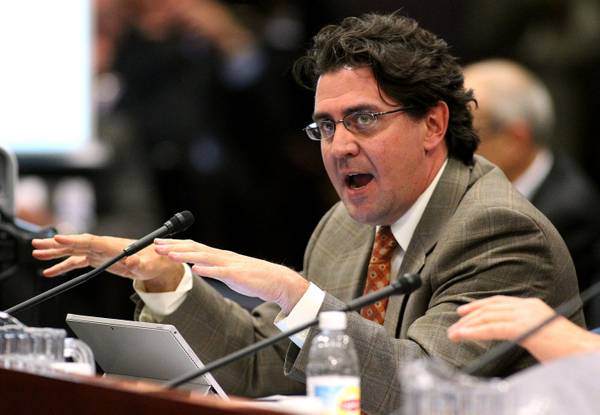CARSON CITY — Gov. Brian Sandoval lined up an army of supporters when he presented a tax plan aimed at modernizing Nevada's last-in-the-nation school system in March, and he pulled off a substantial feat a month later when the bill passed the Republican-controlled Senate 17-4. But Republican allies in the Assembly who favored a different type of tax later presented a plan of their own, and even senators who voted in favor of the bill said their decision was more about the general idea of raising money for schools and toward Sandoval's proposed $7.4 billion, two-year budget than the governor's specific tax policy.
"This is about education and how we're going to pay for it," Republican Sen. Joe Hardy said before the April 21 vote. "I'm going to vote for the plan that we have before us, and I'm going to vote for the plan that comes back to us."
Sandoval listened to the feedback and emerged earlier this month with a new and improved hybrid plan that he hopes can make it through the Legislature during the final two weeks of the session. Lawmakers gave him reason for optimism when they approved funding for most of his education budget initiatives over the weekend, but they'll have to greenlight new taxes to put real dollars behind it.
Here's a look at how Sandoval's new proposal, which is projected to raise an additional $524 million over two years and was discussed in a hearing Thursday, will affect Nevada businesses:
ALL BUSINESSES: All of the estimated 330,000 Nevada business entities will see a bump in their business license fees. Rather than the existing $200 annual cost, corporations will have to pay $500 a year to register with the state, and all other business entities will have to pay $300 a year. Both Sandoval's original plan and a proposal from Republican Assembly leaders Paul Anderson and Derek Armstrong raised the fee, which is the broadest tax option available to lawmakers.
SMALL BUSINESSES: Sandoval's new plan will raise the state's existing modified business tax, which is a levy on payroll and disproportionately hits labor-intensive businesses such as casinos. Business groups who favor the tax say it's tried and true, predictable and easy to calculate, which is why it was the cornerstone of Anderson and Armstrong's plan, AB464. The new rate for most businesses would be 1.475 percent of wages beyond the first $200,000 a company pays out each year, and 2 percent of those wages for the mining industry and financial institutions. Companies would still get to deduct health care premiums for employees from the calculation, unlike in the original Assembly Republican proposal.
BIG BUSINESSES: The new "commerce tax" is the one most like the graduated business license fee that Sandoval originally proposed in SB252. It would create apply an industry-specific tax rate to businesses with more than $3.5 million a year, although the new plan will have fewer than the 30 or so categories in the governor's original bill. Businesses can count 50 percent of their commerce tax bill as a credit against their modified business tax bill — a provision that's intended as a perk to those who employ people. The commerce tax aims to capture more money from capital-intensive businesses such as mines and those that do business in Nevada but aren't based here. About 10,000 companies would pay it, according to the governor's staff.
Economist Jeremy Aguero, who helped fashion the two tax plans for the governor, said if the receipts from the new commerce tax comes in higher than estimated, the extra money would be credited against the payroll tax.
WILL IT COME TO PASS?
Any tax increase faces a rough road through the Republican-dominated Assembly, where nearly a dozen lawmakers have pledged to vote down any tax increase. That leaves a fine line for the governor and his Assembly allies, as approval of a tax package will come down to a handful of swing Republican votes to overcome the required two-thirds majority.
Anderson said that lawmakers' decision to trim the governor's spending plan by $100 million over the weekend, and Sandoval's revisions on the tax plan, would make the tax "a lot easier to swallow" for Assembly members. However, Anderson and Armstrong declined to say Thursday whether they themselves were on board with the new plan.
Armstrong asked during the hearing why the governor's plan called for a new commerce tax to broaden the tax base, but narrowed the base in other ways, such as scaling back on widespread vehicle registration fees.
He noted that the Legislature has already taken steps to broaden the tax base by applying a fee to taxi and ride-hailing company fares, raising the cigarette tax and lowering a modified business tax exemption threshold so more companies would be paying it.
"If we're saying that this is the way that we broaden the base," Armstrong said, "I think we're missing the bigger picture of what this session has been about."
Oversight of the tax would require 23 new employees over the two-year period at a cost of about $4.4 million.
Anderson promised more hearings on the bill.
Sun reporter Cy Ryan contributed to this report.


Join the Discussion:
Check this out for a full explanation of our conversion to the LiveFyre commenting system and instructions on how to sign up for an account.
Full comments policy